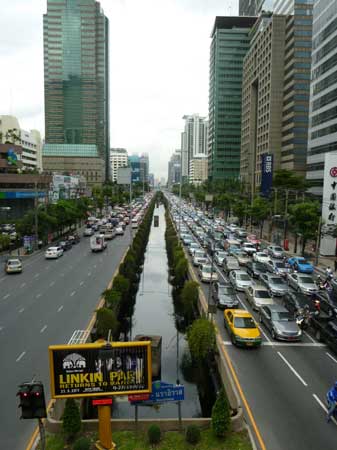|
The floods have gone, some distribution challenges still remain, and Thailand holds a great deal of promise for New Zealand’s food and beverage exporters.
In recent months, Thailand’s plight in coping with the serious flooding that submerged much of Bangkok, forcing businesses to evacuate the city and blocking off major access routes,
was followed with anxiety across the globe.
For exporters, the closure of most of the major retail outlets and the impossibility of moving goods around the sodden nation meant that business with Thailand ground to a halt. Now, with the floods subsiding and consumers returning to Thailand’s central marketplace, the country is bouncing back rapidly and businesses are hungry for growth.
Thailand represents a thriving ASEAN consumer market with a thirst for imported goods. For the 12 months ended December 2011, Thailand was New Zealand’s 15th-largest export market with exports to the country increasing 7.8 percent from NZ$679 million to NZ$732 million. Out of the five ASEAN countries that feature in New Zealand’s top 20 export destinations by value (Malaysia, Indonesia, Singapore, Philippines and Thailand), Thailand experienced the second- greatest percentage increase in the value of New Zealand exports in the period. The highest growth was seen in exports to Malaysia, which grew by 12.8 percent over the same period.
In recognition of this increasing trend towards greater consumption of imported goods, major high-end supermarkets are readjusting to meet their customers’ needs. According to one trade source, “all supermarket chains are reviewing their categories in order to appeal to a new type of customer. They are desperate to get new products to offer their customers so they are very open to new suppliers – whereas before, they were almost impossible to work with. Two years ago you couldn’t even get a product listed without paying lots of money.”
This is obviously good news for New Zealand suppliers.
Distribution challenges
The size of the Thailand market and the scale of the opportunity provide more good news for New Zealand exporters. There are some three million middle-to-upper class households in Bangkok alone.
However, challenges with distribution and a lack of skilled product handling still affect consistency and quality of supply in Thailand. During conversations with buyers in Thailand I’ve heard of one instance where a major food and beverage importer and distributor unwisely chose to freeze a tonne of full cream in an attempt to lengthen the life of the product. It curdled, of course, and they set about trying to hide the spoiled product by mixing it with another batch, which they then sold to their key accounts. Unsurprisingly, they lost many of their customers after this fiasco. This reiterates the point that finding a skilled partner to handle your precious goods is paramount to success.
The restaurant industry in Thailand is dominated by luxury hotels and with so many different global chains vying for the same customers, competition is stiff. In an effort to gain an edge on their competitors, hotel restaurants try to offer their customers a unique dining experience and to this end many are open to running promotional events featuring premium food and beverage products from New Zealand. This offers New Zealand exporters a good way to test the market and develop new sales channels.
Wine sales
As with many other South East Asian countries, the large majority of wine sales in Thailand go through the same luxury hotel channel. Profit margins are tightly controlled in this environment and in an effort to increase profits, hotels have begun to add a 400 to 500 percent mark-up on wines sold in their restaurants. This has understandably resulted in a slowdown in wine sales in their restaurants, but, because they purchase on consignment, a slump in sales does not leave them financially exposed and they seem happy to keep their prices high.
The imported wine trade has also been recently affected by government changes designed to combat importers falsely declaring the value of wine to decrease the amount of duties and taxes payable at the border. A wine’s value is now determined by a system based on the region that the wine comes from.
Essentially what this means is that wine that originates from well-known wine regions such as Marlborough, New Zealand, will automatically be assigned a premium value irrespective of the pedigree of the wine. The net result of this policy is that wine buyers are reluctant to begin importing new wines from regions that are classified as premium by this new system.
|
Trends and FTAs
Unique experiences are not only being provided by hoteliers in Thailand. An interesting trend developing in homes is the Western notion of dinner parties where the host shows off his or her culinary skills by treating friends to a European-style meal paired with imported wine.
While most home chefs are not quite at ‘Masterchef’ level, the novelty of cooking something as simple as, say, a carbonara for guests in your own home is growing in popularity.
Healthy living is also gaining traction, particularly in Bangkok where consumers are widely exposed to global lifestyles and where there is a good demand for mid-range grocery products catering to this sector.
The ASEAN-Australia-New Zealand Free Trade Agreement (AANZFTA) and the New Zealand Thailand Closer Economic Partnership are being utilised by some Thai importers who are importing goods with reduced tariffs from New Zealand.
Australia has wasted no time in reaping the benefits of increased trade flow through their FTAs with Thailand either. While trade volumes from New Zealand are unlikely to match Australia’s anytime soon, we can work towards closing the dollar gap by doing what we do best – that is, competing on quality products offering premium, value-added goods to eager consumers.
Timing is crucial. KFC tried to introduce its drive-through concept ten years ago in Thailand and it flopped. Today, McDonald’s is offering the same service and it’s going
gangbusters.
|

